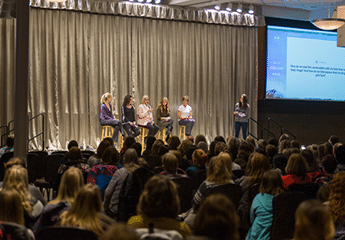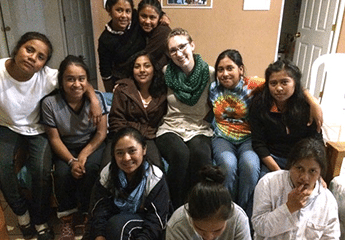I loved going to a Christian college. It’s a unique experience unlike any other. It was a joy to be surrounded by a community of believers daily and to freely worship in and out of the classroom. That sort of fellowship is important, especially during your formative college years. It’s an opportunity that many people gloss over or take for granted.
I realized how much I took it for granted once I graduated. I was catapulted into “the real world” and realized I wouldn’t be surrounded by that fellowship anymore. While at Cornerstone University, I had a fish-in-water mentality. Attending chapel, praying before class, studying the Bible—they all seemed like part of the furniture. Once I left, I realized that I had to do that for myself if I wanted that fellowship and spiritual growth to continue.
And let me tell you, that’s easier said than done.
Reality hits kind of hard after college. Suddenly classes are over and you jump into a job or job seeking. Your whole identity changes from student to employee. You might move to an entirely new town or move back in with your parents. However it goes, it’s a transition. And it’s easy to feel lost during a transition. You can sort of have an identity crisis.
Suddenly, you’re not swiping in and out of chapel or going to Bible classes. The friends you spent your meals and study times with might not be in town anymore. It’s a seismic shift. How do you feed your faith when all those resources are gone?
The obvious answer is—go to church! And of course, that’s a great first step, if you didn’t find a home church in college. Church shopping can be difficult. Different people like different structures and methods of worship, and that’s understandable. A good church can offer great resources, like Bible studies and groups for twenty-somethings.
A lot of navigating your own faith after college, however, is making decisions for yourself. It essentially becomes a spiritual discipline. Do I want to grow in my faith? Then I need to take strides to grow it.
What do those strides look like? It looks different for different people. But the bottom line is that since you’re no longer in college, a lot of decisions that weren’t previously yours are now yours. And if you’re like most twenty-somethings, this is the first time you haven’t been in school for most of your life. A lot of decisions are now yours. This is where developing spiritual disciplines comes in handy.
So here’s the question—how do you develop those spiritual disciplines? Disciplines are formed through habits. Find a spiritual habit that works for you. Habits can be difficult to start off, but finding something that interests you is a good first step.
Ways a Worshipper Can Connect With God
Gary Thompson, a prolific Christian writer and scholar, describes this as “finding your soul’s path to God.” He profiles eight different ways a worshipper can connect with God.
Naturalist
You may be the type of person who connects with God best through the outdoors. The beauty of creation brings you back to the heart of God. If this is you, take some time every week to enjoy His creation. Taking a walk or watching the sunset can be great moments to center your heart during the busyness of life.
Sensates
Although the name sounds strange, it’s fairly straightforward: if you’re a sensate, you connect with God using your senses. Perhaps it’s the grand stained glass in a cathedral or the majestic music of a choir that brings you back to the heart of worship. For sensates, it may be best to find a worship space that is aesthetically pleasing to them.
Traditionalist
A traditionalist finds the heart of God in the traditions and liturgy of the church. They enjoy when worship is formal, structured and saturated with symbols and deep meaning. Traditionalists will thrive in a church that is highly structured and involves a lot of liturgy.
Ascetics
Ascetics are the “introverts” of worshippers. Their worship is soul-searching and inwardly-focused. They feel most comfortable when worshipping with a small group of people, like a house church. Their relationship with God is strengthened in the quiet moments.
Activists
Activists thrive on God’s just attributes. They worship by taking action. Maybe they get more involved in their church, or with a food pantry downtown, or even start their own grassroots campaign against sex slavery. They are the Lord’s fighters and feel closest to his heart when they fight for his cause.
Enthusiasts
As their name may suggest, enthusiasts are all about joy! They embrace the love of God with eager arms. They find His heart in foot-stomping, hand-clapping worship. Enthusiasts feel most comfortable in charismatic, free-flowing worship spaces. Spontaneous prayer and child-like wonder are where enthusiasts reconnect with God.
Contemplative
A contemplative worshipper focuses on God as a Bridegroom—and having a deep, intimate relationship with Him. They find connection to God in deep relationships with their peers. They meditate often on the love of God and how it manifests itself. When they feel the presence of God, they are close to His heart.
Intellectuals
Intellectuals find God through study. A theology major might find this category most appealing. They want to “dig deeper”—study the Bible, read hermeneutics and grow more familiar with the theology of their church. They seek God’s heart through knowledge and find worship in the pages of a book.
Conclusion
You may find that you relate to more than one of these categories, and that’s okay. Study the different “pathways” to God’s heart and meditate on how you might grow closer to Him. Entering into adult life can be a huge challenge, but the first step is discovering how you can best connect with God and grow closer to Him.
Resource: “Sacred Pathways: Finding Your Soul’s Path to God” by Gary Thompson. Grand Rapids: Zondervan, 2010.








